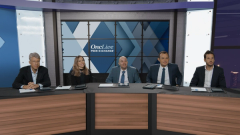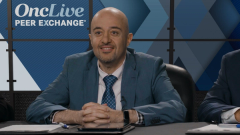
MEDALIST Trial Updates: ASH 2022 and EHA 2022
Dr Komrokji presents key data updates from the MEDALIST trial on luspatercept in patients with lower-risk MDS that were presented at the 2022 European Hematology Association (EHA) Congress and the 2022 ASH Annual Meeting.
Episodes in this series

Transcript:
Rami Komrokji, MD: At ASH [American Society of Hematology Annual Meeting], we had a lot of presentations from the MEDALIST study. Uwe, give us more details on updates on luspatercept that were presented at EHA [European Hematology Association Congress] and ASH. You’ve been involved in all this, so we’ll discuss those in a little more detail.
Uwe Platzbecker, MD: Thank you, Rami. There have been a lot of updates on the initial MEDALIST trial with the longer follow-up data. The results confirm the efficacy and superiority of luspatercept compared with placebo. Also, the durability of response was shown. The observation was made that for patients who have a durable response and get another transfusion event, if you continue treatment beyond this transfusion event, they may get a second, a third, even a fourth consecutive period of transfusion independence. This is very important information for hematologists and clinicians treating patients in the clinical routine.
No. 2, long-term safety with regard to AML [acute myeloid leukemia] evolution has been reported and studied. There’s no imbalance between the arms of luspatercept vs placebo, which is reassuring. This agent can be applied safely and for a long time, and the survival data have been presented. If you compare survival between the 2 arms, blank luspatercept vs placebo, there’s no significant difference confirming it’s safety. But it’s important—and something we always hope for—that for most cases, patients responding have a better survival than nonresponders.
You may say that in hematology-oncology, the responders do better than nonresponders. My counter statement is that if safety is assured, then this is the case. Luspatercept is a safe agent with no significant adverse effects in the majority of the cases. That’s a very important take-home message: patients responding benefit with regard to improvement of hemoglobin levels and transfusion independence, but they also have a better survival compared with patients not responding.
Rami Komrokji, MD: The other thing we saw at ASH is that there are some real-world data coming out. We reported our experience. Our colleagues from Italy had a nice presentation on real-world data. Our experience is duplicating or showing similar benefit that was seen in the MEDALIST study, in terms of response rates, durability, and safety of the drug. As we discussed, hopefully the role of luspatercept will be expanded beyond the current use of the drug.
Transcript edited for clarity.








































